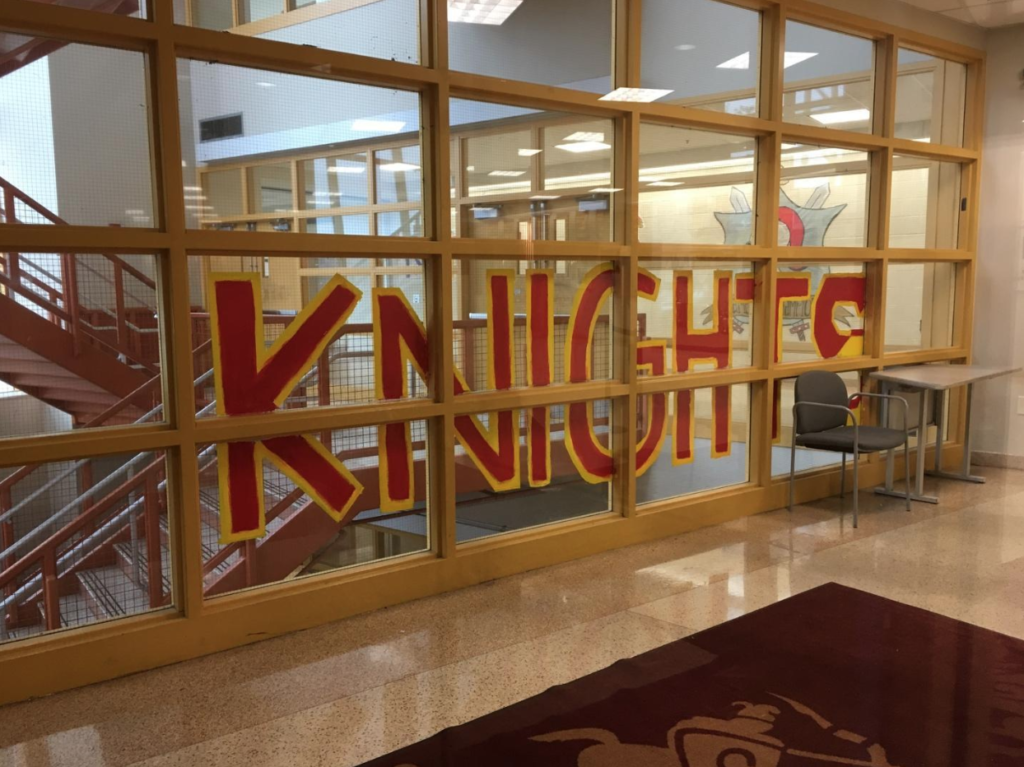Walk on the sidewalk of the Scranton High School, and you’ll see “Go Knights” painted in red and gold on the schools’ windows. The cheerful lettering gives no indication of the turmoil that has engulfed the Scranton School District.

The district is on the brink of being taken over by the state due to a massive budget deficit, stemming from years of mismanagement, said school board member Paige Cognetti. Angry and fed up, several Scranton residents said they want a governor who will prioritize education funding to help turn the district around.
“For the first time in a long time, the people of Scranton have a vested interested in fixing the Scranton School District,” said Jill Murray, executive vice president and chief innovation officer at Lackawanna College. “Education has always been a priority in Scranton, but the state of the local school district has magnified this,” added Vivian Williams, parent of kindergarten, third and fourth grade students.
On October 2017, the Pennsylvania auditor general released a report stating that the school district “shows serious financial instability and an extreme level of board and administrative staff dysfunction rarely observed in school district audits.” The district has been under financial watch by the Pennsylvania Department of Education since June 2017.
Both candidates running for governor have made education a core component of their campaigns, but many Scranton residents are convinced that the incumbent Democratic governor Tom Wolf would be a bigger advocate for increased education funding.
Republican candidate Scott Wagner promised to raise funding by $1 billion, but during his four years in the State Senate he said that would vote against a proposal to increase funding. Meanwhile, Wolf increased education funding by $1 billion during his four-year tenure as Governor.
A candidate’s track record carries much more weight than what is promised during a campaign, said some Scranton residents. Wolf “has shown in his four years that he does have a commitment to education,” said Cognetti. “I don’t have that confidence in Scott Wagner’s blanket statements.”
While on the campaign trail, Wolf hasn’t specified how he would increase education funding if he were re-elected, but he has restated his commitment to the cause. He is currently in the lead by 12 points, according to an October 15 poll by Washington, D.C.-based polling company Morning Consult.
Of particular interest to Scranton is the fair funding formula, which Wolf signed into law in June 2016. The formula is intended to more equitably distribute funds across school districts, taking into account such things as poverty, student enrollment numbers, and the district’s current tax effort. It would mean more money for Scranton, which has an economically disadvantaged student rate of 82%, compared to 71% in Philadelphia and 65% in Pittsburgh, according to the Pennsylvania Department of Education.
But as part of a bipartisan compromise, Wolf and the Pennsylvania General Assembly agreed that only new education dollars would be sent through the formula when it was enacted. Currently only 7 percent of state funds are distributed to schools through the formula, according to a memo from State Rep. Christopher Rabb, D-Phila.
If the formula were to be fully implemented and the Governor’s proposed budget accepted, the school district would receive an additional $3,300 per student from the state, said Greg Collins, a research apprentice at the University of Pennsylvania. Philadelphia would receive an additional $1,800, while Pittsburgh would receive $3,200 less.
“It’s fair to say [Wolf] would push for a much more aggressive timeline on getting the formula to full implementation” if he were re-elected, compared to Wagner, Collins said. “The faster we get to a fair funding formula, the better for Scranton.”
The district implemented a number of cuts in the 2018 budget, which resulted in 16 teacher layoffs, including all of the district’s librarians, and parents are concerned that the program cuts and layoffs won’t ever be reversed. “I don’t know how much more we can cut,” said school board member Katie Gilmartin.
The only way the district can dig itself out of the financial mess is if it receives additional funding, Murray said. “There’s no money left.”
Despite Wagner’s promise of a $1 billion increase in education funding, some are skeptical that he would follow through given the plan’s lack of specifics. “I think any campaign promise that doesn’t have a plan behind it is just false and not something you can trust,” Cognetti said.
Wagner’s campaign website states that $300 million of the $1 billion would be coming from block grants, with the remaining $700 million coming from increasing corporate taxes, privatizing alcohol sales, leasing the liquor wholesale system, implementing welfare reform, and other cost-saving measures.
But it’s unclear how Wagner’s plan would pan out. Liquor stores, for instance, are very profitable for the state, so it wouldn’t make sense to sell them, said Marc Stier, the director of the Pennsylvania Budget and Policy Center.
Still, Wagner might ultimately be able to deliver more as Governor compared to Wolf given the state legislature is likely to remain Republican, Collins said. “Whereas a Republican legislature wouldn’t go along with Wolf’s plan to raise taxes, they would go along with [Wagner’s] plan to redistribute funds from one social plan into education.”
Regardless of who wins, it’s clear the Scranton School District is in need of assistance from the state. “The implications for not funding education or not seeing increases to funding are not just detrimental, but are devastating to Scranton,” said Murray.
The Wagner and the Wolf campaigns did not respond to requests for comment.
Email the Author, Millie Dent at mcd547@nyu.edu